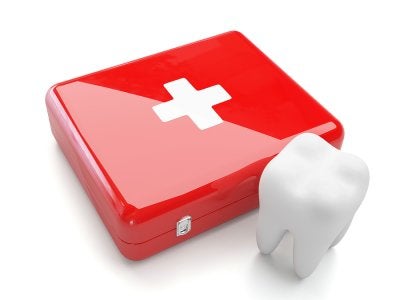While you probably strive to protect your mouth and teeth from injury or infection, life isn’t always easy to control. Certain dental situations will require a prompt trip to an emergency dentist near Bel Air , while others may be handled with at-home care until you can see your dentist during regular business hours. Here’s what to do if you find yourself facing a dental emergency:
Stop Any Bleeding
If you sustain injury to the soft tissues of the mouth, or if you have a tooth knocked out, partially dislodged, or broken, it’s vital to stop the bleeding as soon as possible. This can be accomplished by rinsing your mouth gently with a warm saltwater solution and then applying pressure to the area.  You may use either a folded piece of gauze or a damp tea bag over the area to keep pressure on for 15 to 20 minutes. If the bleeding is not controlled after that, continue applying pressure but seek treatment immediately either at an emergency room or an emergency dentist.
You may use either a folded piece of gauze or a damp tea bag over the area to keep pressure on for 15 to 20 minutes. If the bleeding is not controlled after that, continue applying pressure but seek treatment immediately either at an emergency room or an emergency dentist.
Control Swelling and Pain
Dental emergencies typically come with pain, and often are accompanied by swelling. Unless your doctor has placed restrictions on it, take an over-the-counter pain reliever to help with the pain. Ibuprofen will also help to control inflammation and swelling. Apply cold compresses to the face over the area where there is pain and swelling. A gentle rinse of warm water, either plain or with a touch of salt, can also be soothing until you can get to the emergency dentist.
Preserve the Tooth
If your dental emergency involves a dislodged or knocked out tooth, it’s important to keep the tooth viable if at all possible. Do not handle the tooth by the root; pick it up by the crown and very gently rinse it with warm water. Never attempt to clean the attached tissue off the root. If it is possible, reinsert the tooth in its socket, taking care to ensure it is facing the proper direction. If reinsertion is not possible, place the tooth in a container of milk and try to get to the emergency dentist within one hour if at all possible.

